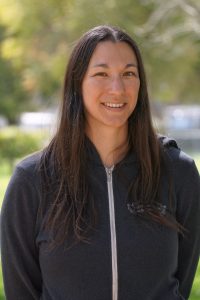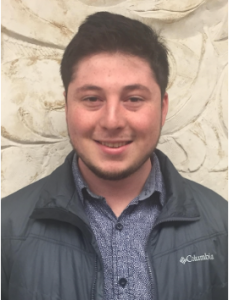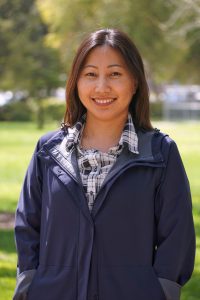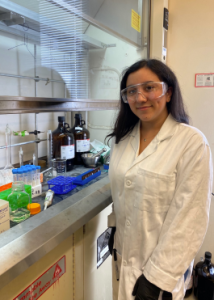 Ami Rose, Ph.D. Candidate
Ami Rose, Ph.D. Candidate
B.S. Chemistry and B.S. Applied Mathematics CSU, Chico, 2017
Ami Rose graduated with a Bachelor of Science from CSU, Chico in 2017, where she conducted an honors project in collaboration with Sierra Nevada Brewing Company. Ami is currently a senior graduate student in the Jacquelyn Gervay Hague lab at UC Davis, and helped establish the UC Davis test plot at Kearney Agricultural Research and Extension Center in Fresno. During her time in the JGH lab, Ami has developed efficient methods for extracting and measuring the polyphenols and alkaloids in California grown tea varieties. These optimized methods allow the lab to compare the chemical profiles of California grown and known high quality tea varieties from the freshly picked leaf to the finished consumed product. Following her passion for teaching, Ami was also recently hired as an Assistant Professor of Chemistry at Folsom Lake College, where she hopes to grow the Food Science curriculum and research connection with UC Davis.
Matthew Orellana, Ph.D. Candidate
B.S. Biochemistry, San Francisco State University, 2018
Matthew is focused on the synthesis of lipids with bioorthogonal functional groups and synthesis of complimentary fluorophores. These metabolic precursors are delivered to various growing media and withdrawn from total lipid extracts by capitalizing on the specificity of the Copper(I)-catalyzed azide-alkyne 1,3-dipolar cycloaddition (CuAAC). The result of this strategic design is isolation of lipid metabolites parceled with highly-ionizable fluorophores. This work, accompanied by pure glycolipid standards previously synthesized by our lab, provide the synthetic toolkit necessary to detect and characterize femtomolar amounts of metabolites by HPLC-MS/MS.
Bao Vue, Ph.D. Candidate
B.S. Chemistry, California State University Fresno, 2006
M.S. Chemistry, California State University Fresno, 2008
Bao’s research focuses on applying ReSET (Regioselective Silyl Exchange Technologies) to functionalize carbohydrates using continuous flow microfluidics. Natural products have been widely used as starting materials, reagents, or as targeted products of organic synthesis. Often, these compounds contain reactive functional groups like hydroxyls, amines, thiols, or carboxylic acids. Protecting or converting these functional groups into a less reactive functionality involves multiple steps and is time consuming. The focus of Bao’s Ph.D. research is to develop a time efficient and economical synthetic route to functionalized sugars and natural products. To accomplish this goal, she began by converting Regioselective Silyl Exchange Technology (ReSET) synthetic routes from batch to continuous flow synthesis. ReSET is a synthesis tool, which converts the reactive hydroxyl group into a silyl ether, then regioselectively converts the silyl group to an acetate. In her system, the reaction solution continuously flows through a small reactor with controllable temperature, pressure, and flow rates. An advantage of the silicon projecting group is the in situ characterization of silyl sugar intermediates using silicon-29 NMR, which is a unique and powerful tool to monitor and optimize the chemical reactions.
Lauren Leyva
Undergraduate Researcher
Lauren Leyva is a third-year biochemistry and molecular biology major at UC Davis. This past summer, she began working at the Coffee Center on the chemistry team with Dr. Gervay-Hague and Dr. Ristenpart. Lauren has enjoyed her work at the Coffee Center and Chemistry Annex as she has had the opportunity to learn more about the chemical analysis and complex science behind coffee with Dr. Natalia Fernandes. Since joining the lab this summer, Lauren has partaken in the roasting project. Being a part of Dr. Gervay-Hague and Dr. Ristenpart’s research has furthered her interest in the science of coffee and academic research. Lauren looks forward to supporting and assisting future research projects.


